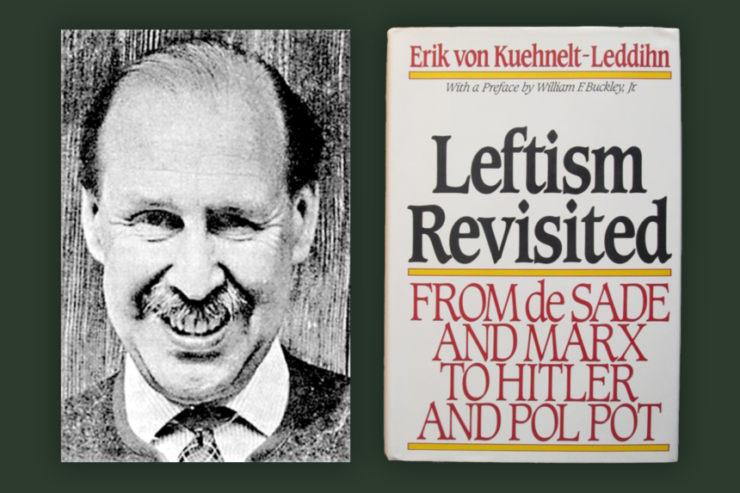Sometimes while one is seeking the truth, God quietly places a helpful giant in one’s path. In 1983, in ARAMCO’s Dhahran Library, Saudi Arabia, I came across an amazing National Review article “Islam: Another Wave Length” by the Austrian Erik von Kuehnelt-Leddihn. It was amazing to me because, on that one page, he managed to capture the philosophical and international nature of Islam. More amazing, however, was that it escaped Saudi censorship. Becoming pen pals, EKL enjoyed my sending numerous Islamic articles (some hilarious hypocrisy) from the English language “Arab News.”
My family returned to the United States permanently in 1986, to live on our Douglassville, Pennsylvania, farm. Erik promised to visit for a few days every Fall if paid lectures could be arranged and the Intercollegiate Studies Institute (ISI) greatly helped with that cause. The most requested EKL lecture was “Right, Left, Conservatives and Liberals, an Exercise in Semantics.” Right is right and Left is wrong in all languages, including the Ural-Altaic or at least has that connotation.
As one who loved America more than most Americans, Erik von Kuehnelt-Leddihn invariably stated, “The great problem in America is that the half-educated are in charge of the education and the news.” Once an aggrieved educator asked to please identify these so-called half-educated. Erik replied, “Well okay, if you want better terms they are highly-specialized idiots commenting on matters outside their purview.” (For additional background on the “half-educated” please consider EKL’s essay “Scita Et Scienda: The Dwarfing of Modern Man.”)
Dare we say the college presidents who recently testified to Congress regarding campus anti-semitism may not be half-educated? Harvard’s Claudine Gay belatedly and reluctantly resigned only to be retained as a faculty member. Genuine scholars, such as a Kuehnelt-Leddihn was, need not apply for any vacancies for college presidents.
F. Cooper Adamo correctly wrote in Chronicles, “Kuehnelt-Leddihn was not a thinker of secondary importance, but rather a quiet titan who was befriended by many major conservative thinkers of the 20th century: William F. Buckley Jr., Russell Kirk, Otto von Habsburg, Friedrich A. Hayek, M. E. Bradford, Ludwig von Mises, Wilhelm Roepke, Ernst Junger, and even Cardinal Joseph Ratzinger.” That’s the short list which also includes our Editor-in-Chief Paul Gottfried. EKL died May 26, 1999, several days after successful aneurysm surgery. All his estate writings are with the Brenner Archive, University of Innsbruck. For example, there are 62 letters with Henry Kissinger, 30 letters with Ida Friederike Goerres mentioned often in EKL’s posthumous book Love and the Genders, and 9 letters with George F. Kennan. Being an arch-liberal monarchist, EKL communicated with Otto Habsburg and family 228 times.
Once Erik told me that he wrote a letter to a famous evolutionist which the Brenner Archive may now possess. Erik asked the man, “Is it true that the 3-toed sloth young are born with hair hanging to their belly?” There was no answer.
Admiration is too small a word to describe EKL’s fluency in eight languages and having a reading knowledge of 17 more languages. At age 80, he showed me his notebook of his efforts at learning Arabic phonetically. Traveling the globe seeking out the human condition, his Curriculum Vitae included the line: “I have repeatedly altered my line of activities in order to attain and retain a comprehensive view of the humanities. My skeptical views of democracy resemble those of the Founding Fathers, Alexis de Tocqueville, Jacob Burckhardt, and especially Montalembert whom I greatly admire.”
In a 1985 letter to EKL, I asked him how, considering his vast reading knowledge and there being an infinite number of ideas and opinions, he went about discerning the truth of any matter. His reply is a keeper, “Remember, that there are ‘false, but clear ideas’ [une fausse idée claire] an expression of de Tocqueville. And they indeed do prosper—everywhere. The stupider & simpler a notion, the more generally it will be accepted. That is true in all domains.”
Late in life, EKL loved the hobby of oil painting. Two oil paintings of his had a message and were photographically reduced for postcard correspondence. One is “Modern Man: The Parromeleon”; sometimes modern man is partly a simplistic repeating parrot and sometimes a chameleon changing colors for easy camouflage.
Another oil painting is Erik’s rendition of “Stupidity Races Through the World.” What are the characteristics of Stupidity? Stupidity is a naked human-like figure racing full stride alone at the 931 km marker showing absolutely no sign of weariness. Stupidity has no ears and no brain, only a large hole in the head. Stupidity follows his nose (his eyes see but he has no brain to process information). Stupidity has no arms because work is unnecessary. Stupidity has a short animal tail, not being fully human. And we see buzzards circling over the last village as Stupidity leaves death in his wake.

Bill Buckley’s “Firing Line” hosted Erik von Kuehnelt-Leddihn in October 1991 just shortly before Ronald Reagan’s oil strategy, then being carried out by the George H.W. Bush administration, had bankrupted the Soviet Union. The subject was “The new Europe and the Uses of Monarchy.” Criticizing democracy and extolling monarchy, Erik said, “… wisdom comes from two things: from knowledge and experience—because knowledge alone is not sufficient—and must have experience. Out of this—doesn’t happen automatically, but can come, wisdom.” Broadcast time was short so Erik did not get to say his usual, “Democracy has no future, it failed 2500 years ago in Greece.”
Woodrow Wilson wanted to make the world safe for democracy. Erik criticized that poor idiot who never gave a thought how to make democracy safe for the world. Europe was bled white in World War I. Everyone wanted peace negotiations, but Wilson entered to continue the war longer. As a child it affected Erik deeply as he explained, “There was little food and many nights I cried myself to sleep”—and he repeated emotionally, “I cried.”
My wife, Marsha, always was impressed by Erik’s interesting conversation at breakfast. Usually it started as, “on this date historically Napoleon or Philip Melancthon did something or other.” I asked Erik how long each day he studied? In his younger years he studied 15 to 16 hours but as he grew older he only pursued this activity 12 to 14 hours each day. One morning, I couldn’t sleep and was perusing The Trial of Socrates by I.F. Stone. Erik came downstairs and rounding the corner he said, “Oh my, I should be studying.” He felt guilty. Erik reassured me that Socrates disliked democracy because he quoted Homer, “Not good is the rule of many, one should be ruler.”
When an intellectual group met privately at the Western Humanities Institute in Portland, Oregon, in 1981, as Erik explained, “They lamented that the Bible and other books are long and complicated such that there is little understanding for the common man.” Erik asserted such a document could be written in 48 hours. They laughed and Erik accepted the challenge. The result was “The Portland Declaration” 26 points. It was printed in National Review (October 16, 1981). Several years later, Erik said that Russell Kirk agreed with every single point but could not endorse it because it’s an ideology. To which Erik replied, “Everyone has an ideology; take any common man in a 15 minute cross-question conversation and the faint outline of ideology can be discerned.”
Erik von Kuehnelt-Leddihn was my friend and mentor. I loved the dear old man as if he was my grandfather. The last time I saw him was October 10, 1998, at ISI’s headquarters in Wilmington, Delaware, as the Philadelphia Society held a tribute event for him. Marsha and I stayed well after the close. No one had made plans to take Erik back to his hotel. Several volunteered. Erik asserted, “I will go with George and Marsha.” If only everyone could have such a relationship.

Leave a Reply